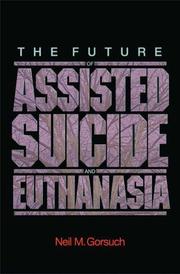| Listing 1 - 2 of 2 |
Sort by
|

ISBN: 0691124582 9780691124582 0691140979 1282458442 1400830346 9786612458446 Year: 2006 Publisher: Princeton: Princeton university press,
Abstract | Keywords | Export | Availability | Bookmark
 Loading...
Loading...Choose an application
- Reference Manager
- EndNote
- RefWorks (Direct export to RefWorks)
The Future of Assisted Suicide and Euthanasia provides the most thorough overview of the ethical and legal issues raised by assisted suicide and euthanasia--as well as the most comprehensive argument against their legalization--ever published. In clear terms accessible to the general reader, Neil Gorsuch thoroughly assesses the strengths and weaknesses of leading contemporary ethical arguments for assisted suicide and euthanasia. He explores evidence and case histories from the Netherlands and Oregon, where the practices have been legalized. He analyzes libertarian and autonomy-based arguments for legalization as well as the impact of key U.S. Supreme Court decisions on the debate. And he examines the history and evolution of laws and attitudes regarding assisted suicide and euthanasia in American society. After assessing the strengths and weaknesses of arguments for assisted suicide and euthanasia, Gorsuch builds a nuanced, novel, and powerful moral and legal argument against legalization, one based on a principle that, surprisingly, has largely been overlooked in the debate--the idea that human life is intrinsically valuable and that intentional killing is always wrong. At the same time, the argument Gorsuch develops leaves wide latitude for individual patient autonomy and the refusal of unwanted medical treatment and life-sustaining care, permitting intervention only in cases where an intention to kill is present. Those on both sides of the assisted suicide question will find Gorsuch's analysis to be a thoughtful and stimulating contribution to the debate about one of the most controversial public policy issues of our day.
Assisted suicide --- Euthanasia --- Moral and ethical aspects --- Law and legislation --- Suicide, Assisted --- ethics --- legislation & jurisprudence --- Assisted suicide - Moral and ethical aspects - United States. --- Assisted suicide - Law and legislation - United States. --- Euthanasia - Moral and ethical aspects - United States. --- Euthanasia - Law and legislation - United States.
Book
ISBN: 0674064798 0674068696 9780674068698 9780674064799 9780674063723 0674063724 Year: 2012 Publisher: Cambridge, Mass. : Harvard University Press,
Abstract | Keywords | Export | Availability | Bookmark
 Loading...
Loading...Choose an application
- Reference Manager
- EndNote
- RefWorks (Direct export to RefWorks)
Suicide is a quintessentially individual act, yet one with unexpectedly broad social implications. Though seen today as a private phenomenon, in the uncertain aftermath of the American Revolution this personal act seemed to many to be a public threat that held no less than the fate of the fledgling Republic in its grip.Salacious novelists and eager newspapermen broadcast images of a young nation rapidly destroying itself. Parents, physicians, ministers, and magistrates debated the meaning of self-destruction and whether it could (or should) be prevented. Jailers and justice officials rushed to thwart condemned prisoners who made halters from bedsheets, while abolitionists used slave suicides as testimony to both the ravages of the peculiar institution and the humanity of its victims. Struggling to create a viable political community out of extraordinary national turmoil, these interest groups invoked self-murder as a means to confront the most consequential questions facing the newly united states: What is the appropriate balance between individual liberty and social order? Who owns the self? And how far should the control of the state (or the church, or a husband, or a master) extend over the individual?With visceral prose and an abundance of evocative primary sources, Richard Bell lays bare the ways in which self-destruction in early America was perceived as a transgressive challenge to embodied authority, a portent of both danger and possibility. His unique study of suicide between the Revolution and Reconstruction uncovers what was at stake-personally and politically-in the nation's fraught first decades.
Suicide in mass media. --- Suicide --- Killing oneself --- Self-killing --- Death --- Right to die --- Mass media --- Moral and ethical aspects --- Political aspects --- Social aspects --- History. --- Causes --- Suicide - United States - History --- Suicide - Political aspects - United States --- Suicide - Moral and ethical aspects - United States --- Suicide in mass media --- Suicide - Social aspects - United States --- Etats-Unis --- History
| Listing 1 - 2 of 2 |
Sort by
|

 Search
Search Feedback
Feedback About UniCat
About UniCat  Help
Help News
News